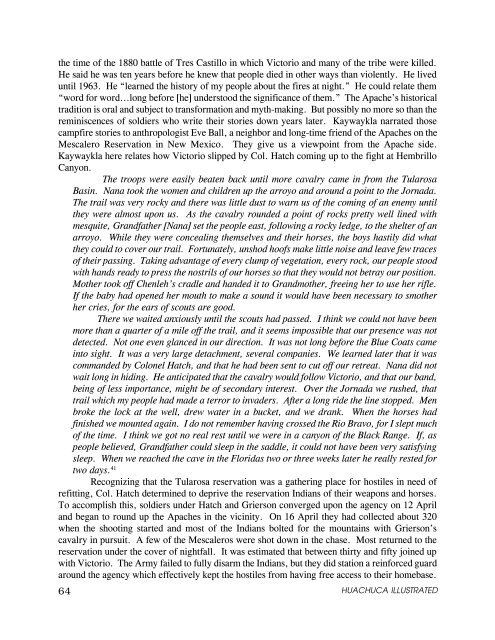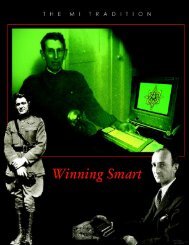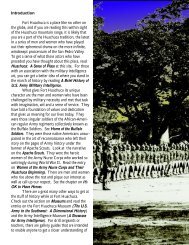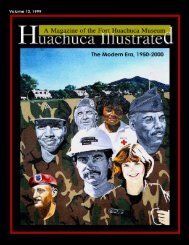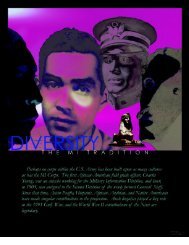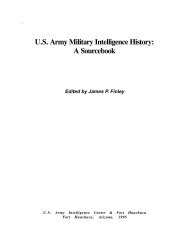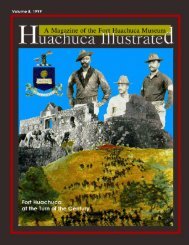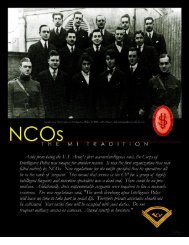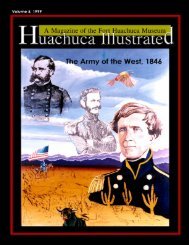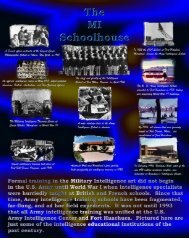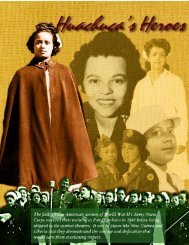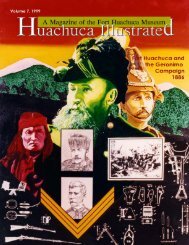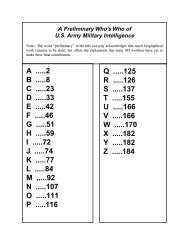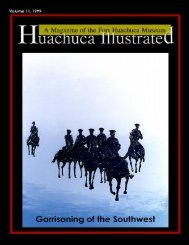Apache Campaigns - Fort Huachuca - U.S. Army
Apache Campaigns - Fort Huachuca - U.S. Army
Apache Campaigns - Fort Huachuca - U.S. Army
You also want an ePaper? Increase the reach of your titles
YUMPU automatically turns print PDFs into web optimized ePapers that Google loves.
the time of the 1880 battle of Tres Castillo in which Victorio and many of the tribe were killed.<br />
He said he was ten years before he knew that people died in other ways than violently. He lived<br />
until 1963. He “learned the history of my people about the fires at night.” He could relate them<br />
“word for word...long before [he] understood the significance of them.” The <strong>Apache</strong>’s historical<br />
tradition is oral and subject to transformation and myth-making. But possibly no more so than the<br />
reminiscences of soldiers who write their stories down years later. Kaywaykla narrated those<br />
campfire stories to anthropologist Eve Ball, a neighbor and long-time friend of the <strong>Apache</strong>s on the<br />
Mescalero Reservation in New Mexico. They give us a viewpoint from the <strong>Apache</strong> side.<br />
Kaywaykla here relates how Victorio slipped by Col. Hatch coming up to the fight at Hembrillo<br />
Canyon.<br />
The troops were easily beaten back until more cavalry came in from the Tularosa<br />
Basin. Nana took the women and children up the arroyo and around a point to the Jornada.<br />
The trail was very rocky and there was little dust to warn us of the coming of an enemy until<br />
they were almost upon us. As the cavalry rounded a point of rocks pretty well lined with<br />
mesquite, Grandfather [Nana] set the people east, following a rocky ledge, to the shelter of an<br />
arroyo. While they were concealing themselves and their horses, the boys hastily did what<br />
they could to cover our trail. <strong>Fort</strong>unately, unshod hoofs make little noise and leave few traces<br />
of their passing. Taking advantage of every clump of vegetation, every rock, our people stood<br />
with hands ready to press the nostrils of our horses so that they would not betray our position.<br />
Mother took off Chenleh’s cradle and handed it to Grandmother, freeing her to use her rifle.<br />
If the baby had opened her mouth to make a sound it would have been necessary to smother<br />
her cries, for the ears of scouts are good.<br />
There we waited anxiously until the scouts had passed. I think we could not have been<br />
more than a quarter of a mile off the trail, and it seems impossible that our presence was not<br />
detected. Not one even glanced in our direction. It was not long before the Blue Coats came<br />
into sight. It was a very large detachment, several companies. We learned later that it was<br />
commanded by Colonel Hatch, and that he had been sent to cut off our retreat. Nana did not<br />
wait long in hiding. He anticipated that the cavalry would follow Victorio, and that our band,<br />
being of less importance, might be of secondary interest. Over the Jornada we rushed, that<br />
trail which my people had made a terror to invaders. After a long ride the line stopped. Men<br />
broke the lock at the well, drew water in a bucket, and we drank. When the horses had<br />
finished we mounted again. I do not remember having crossed the Rio Bravo, for I slept much<br />
of the time. I think we got no real rest until we were in a canyon of the Black Range. If, as<br />
people believed, Grandfather could sleep in the saddle, it could not have been very satisfying<br />
sleep. When we reached the cave in the Floridas two or three weeks later he really rested for<br />
two days. 41<br />
Recognizing that the Tularosa reservation was a gathering place for hostiles in need of<br />
refitting, Col. Hatch determined to deprive the reservation Indians of their weapons and horses.<br />
To accomplish this, soldiers under Hatch and Grierson converged upon the agency on 12 April<br />
and began to round up the <strong>Apache</strong>s in the vicinity. On 16 April they had collected about 320<br />
when the shooting started and most of the Indians bolted for the mountains with Grierson’s<br />
cavalry in pursuit. A few of the Mescaleros were shot down in the chase. Most returned to the<br />
reservation under the cover of nightfall. It was estimated that between thirty and fifty joined up<br />
with Victorio. The <strong>Army</strong> failed to fully disarm the Indians, but they did station a reinforced guard<br />
around the agency which effectively kept the hostiles from having free access to their homebase.<br />
64<br />
HUACHUCA ILLUSTRATED


